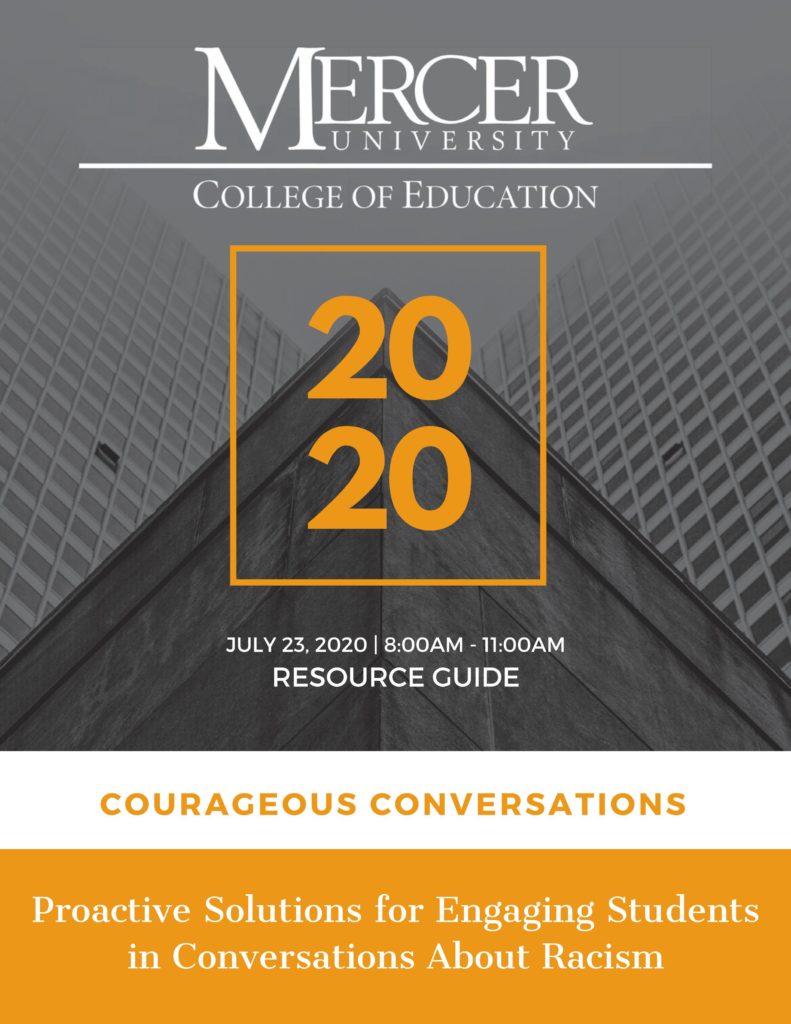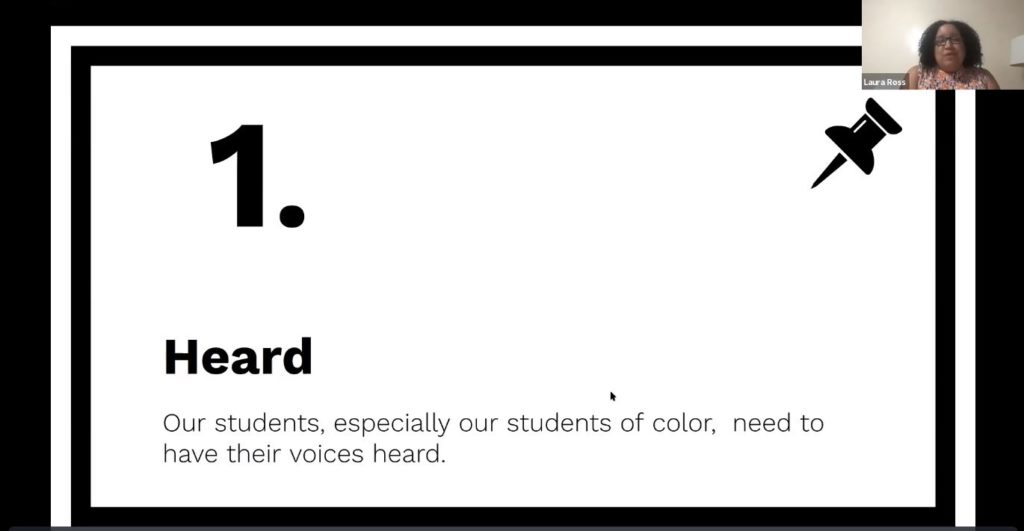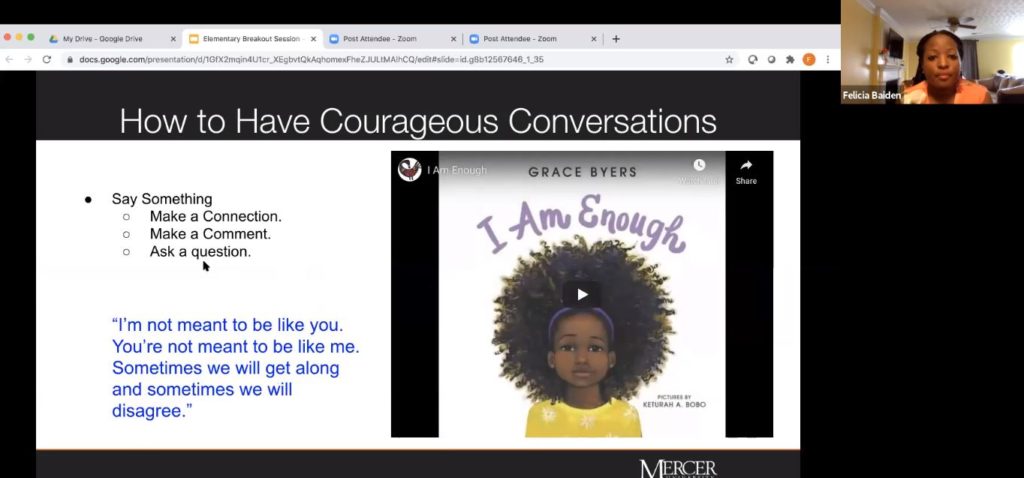A group of faculty members in Mercer University’s College of Education came together for comfort and support amid the recent racial trauma and social unrest in America. They created a group that was a safe space to help each other through the stress and pain and think about actionable steps that could make a difference.
These discussions inspired them to host a free three-hour virtual conference titled “Courageous Conversations,” which they organized in just three weeks. More than 150 educators across Georgia and the United States attended the July 23 event. It provided teachers and administrators in the birth to 12th-grade levels with tools, resources and strategies for engaging their students in conversations about racism.
“Courageous Conversations” opened with a keynote speech by Laura Ross, a school counselor at Five Forks Middle School in Lawrenceville and 2020 American School Counselor Association School Counselor of the Year. It was followed by breakout sessions for early childhood, elementary, middle, high school and building/district-level educators and a panel discussion.
The organizers hope to later host a two-day conference that delves more into this topic and how to contribute to change in the future, said Dr. Robbie Marsh, assistant professor of special education.
Creating a culture of care

The Mercer faculty knew it was important to host the event before the 2020-21 school year started since educators would be returning during a time of uncertainty amid COVID-19 and racial trauma, said Dr. Leah Panther, assistant professor of literary education. The goal was to help teachers and administrators become more comfortable facilitating conversations in their classrooms and schools about everything going on in the country, said Dr. Cynthia Anderson, assistant professor of education.
“This symposium was a place to have that conversation with other educators,” Dr. Panther said. “There’s never a point when you’re ready; there’s never a point where you know everything. You act anyway because this is about lives. This is truly a life or death situation. It was imperative for us to make sure these conversations and these action steps were happening prior to the beginning of the school year. We’re entering schools in a very untenable place. We wanted educators to have tools … to make sure antiracism was not lost in that shuffle and it was an explicit conversation that would be had the first days of the school year.”
The organizing team was nervous about hosting the event in a virtual environment and addressing a topic that can be uncomfortable. But their passion and purpose snuffed those fears, and the response from attendees was overwhelmingly positive, Dr. Anderson said.
Participants indicated in a survey how beneficial and timely this professional learning experience was for them and thought the breakout sessions were powerful and profound, said Dr. Felicia Baiden, assistant professor of clinical practice. They wished the conference could have been longer and were interested in additional training on the topics of equity and social justice.
“That gives our group more momentum, passion and commitment to this work,” she said.
The event was a “right now” action that gave attendees tools they can use immediately but not a long-term solution to the racial inequities that have existed in education for so long, Dr. Marsh said. It’s not a “one-shot thing” but a movement that requires continuous work to bring about change, Dr. Anderson said.
“There’s a need for building coalitions to make this happen. It’s necessary for everyone to be engaged in it. We need to hear all voices, not just the individuals who might seemingly be impacted by this issue,” said Dr. Justin Ballenger, assistant professor of STEM education.
School leaders need to think about how to embed racial equity in their school culture and make it the standard, he said. They have to have an equity-centered curriculum where everyone’s voices are heard, Dr. Baiden added.
“I hope this conference gives them some courage and empowers them,” she said. “This is just another layer of understanding that our educators have to develop. Lives are being lost. We all have to work together to ensure that this racist system is addressed. If we can create a culture of care where everybody’s thoughts, values and cares are represented, I think we’ll see a real difference in our society.”
This needs to happen in all schools, regardless of whether they have a diverse population, Dr. Marsh said. It’s not an issue of one community but all communities, and educators need to fight for what’s right.
In her keynote speech, Ross stressed that students — especially students of color — need to have their voices heard; to have their lives and experiences humanized; to have a space to talk so healing can begin; to have hope for the future and for change; and to have a place of safety and comfort.

Lifelong learners
Being antiracist is a lifelong commitment that requires constant education and reflection of personal practices, ideology, biases and values, Dr. Baiden said. Self-reflection is a growing process for everyone, and it’s important to stay focused on why you’re there in the first place, Dr. Anderson said.
Teachers have to model this in their classrooms and through their teaching, and they have to make sure their students feel like they have a voice.
“Modeling is the best way,” Dr. Anderson said. “I know that’s not the quick fix, but we cannot disconnect from the realities of the world we’re living in, so we’ve got to make sure that our preservice teachers understand the context of the world and the importance of building relationships.”
Dr. Anderson works with adult learners at the Henry County Regional Academic Center, and that allows for opportunities to engage in conversations about what her students and their families are going through.
Dr. Baiden said she plans activities for her classes that embed the importance of student voice and connecting with students, parents, colleagues and the community. She also makes herself vulnerable, particularly when discussing topics that may be deemed as contentious. By admitting that she doesn’t always have the answers and is on a learning continuum, students become more comfortable and courageous sharing their thoughts and experiences.
“My classes are all about reflection,” Dr. Marsh said. “I’m trying to teach them how to think about themselves as part of the problem and part of the solution, because we are both. When we understand what our students’ needs are, we will always make the right decision because we know what the problem is, rather than assuming we know.”
In one of Dr. Ballenger’s courses, his students complete an assignment where they have to step outside their comfort zone and immerse themselves in unfamiliar cultures. This gives them a human connection, which builds respect and makes it harder to dehumanize that culture, he said.
The role of teachers is not just to educate academically but to look at the social, emotional, psychological and physical welfare of all students, and by doing that, they will help build an education system that will generate future adults that will make credible decisions that aren’t based on stereotypes, Dr. Anderson said. Teachers can embed in their students a sense of self-worth and demonstrate how to look at people as people rather than judging them based on the color of their skin.










